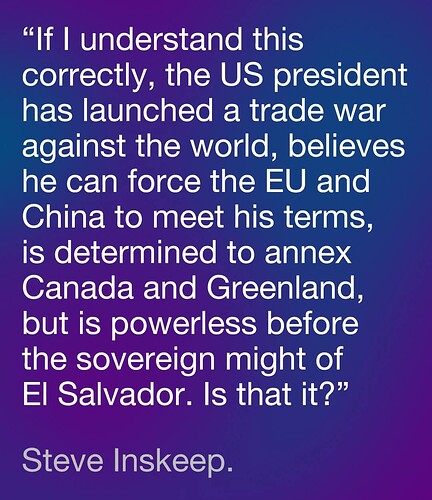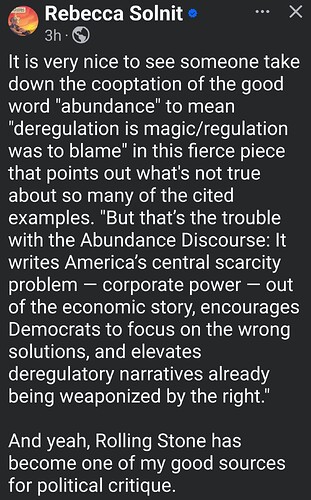Yeah, no doubt… it’s also funny how he’s made an entire career out of attacking elites, and he himself IS an elite… both his parents were college professors, a category of people he loves to wag his finger at…
Funny that he didn’t just go right into GOP politics?
I think he sees himself as an objective observer of events in American history and culture, not an active participant.
If he’s an objective observer and not a participant, he should be keeping his whack-ass opinions to himself instead of publishing them in one of the biggest newspapers in the world and appearing on television (except for calling Krasnov a mafioso, everyone should do that everywhere)
Exactly! But, oh, how can we not let such a great and wise man have a big ass bully pulpit for his mediocre ideas!!!
Ugh… I also wish that Capehart were a bit bolder, too.
Lol, as a great and wise man with mediocre ideas, I must concede that you make a valid argument.
I wish Capeheart let loose a bit, too. You can literally see him struggling to hold himself back on Newshour. I hope he frees himself from the Post and just says everything he’s thinking on his own platform someday.
Almost 10 years into the Trump era and Teen Vogue is still embarrassing the NY Times and Wapo by doing actual journalism.
The David Nyhan Prize for Public Policy Journalism goes to Michael Harriot, an award-winning journalist, bestselling author, poet, and public historian. Harriot has long stood at the forefront of incisive, unflinching journalism that unpacks the complexities of race, power, and policy in America. From his early reporting at Ebony to his work at The Root and The Guardian, and most recently as a columnist at TheGrio, Harriot has consistently illuminated the intersections of race and American democracy.
Thank you for posting that link! I had read some of Harriot’s writings, and I’m glad to see him being noticed by people who care about journalism.
And it looks like there may be some hope for Kansas:
Rose Conlon of KMUW and the Kansas News Service, has been selected by the judging committee as the Emerging Talent prize’s inaugural recipient.
A Wichita-based public radio reporter, Conlon brings a fearless and deeply empathetic lens to some of the country’s most contested policy issues—particularly women’s health, reproductive rights, and rural health care access. Her reporting has shed critical light on the rising incidence of pregnancy-associated domestic violence in Kansas, and exposed dangerous gaps in nursing home oversight, holding both corporations and public decision-makers to account.
AP News might not be allowed at the White House, but they’re not cowed:
Here’s one example from this piece: Last week, Abundance co-author Ezra Klein went viral on social media. In a widely shared video clip from Jon Stewart’s podcast, Klein described the maddeningly bureaucratic process for deploying rural broadband funding under the Biden administration’s bipartisan infrastructure bill — a procedure so cumbersome that barely any of the entities seeking these grants have even finished the application process, years after the bill’s passage.
The anecdote hit hard — Stewart groaned and cursed as Klein elegantly demonstrated the central thesis of his book, Abundance: Red tape and overregulation, allegedly the outgrowth of progressives’ obsession with process over outcomes, have become primary drivers of scarcity in America. Boosted by Fox News, Elon Musk, and thousands of retweets, the soundbite was the kind of fable of inefficient liberal government that Ronald Reagan told throughout the 1980s.
There was just one problem with the story’s premise: It is demonstrably false.
The Kafkaesque nature of Biden’s broadband application process was not, in fact, the result of “everything-bagel liberalism,” pressure from doctrinaire leftists, or Democratic politicians’ penchant for governing through checklists, which Klein and his co-author, Derek Thompson, frame in Abundance as the key obstacles to housing security, decarbonization, and other critical 21st century needs.
Rather, this burdensome procedure was created at the insistence of vote-withholding Republican senators and their cable industry donors — companies seeking to block funding to upstarts that might challenge their regional telecom monopolies or force them to provide affordable prices for broadband. After they loaded up the funding legislation with a Byzantine process, telecom giants and GOP-led states — not protocol-obsessed lefties or overly rigid bureaucrats — then manufactured a monthslong fight over what constitutes “affordable” rates, delaying quick funding for the build-out.
There are lessons to draw from this failure — for instance, Democrats’ unrequited pursuit of bipartisanship can lead them to undermine their legislative initiatives. But the story Klein shared absolutely doesn’t support the thrust of Abundance or the themes of the wider Abundance movement.
In fact, the takeaway from the broadband tale is that the biggest obstacles to efficiency and abundance are often corporate power and its corrupting influence on our politics — factors typically downplayed or unmentioned in the Abundance Discourse.
Censoring such topics from the conversation may get Klein and Thompson platformed by large media outlets, praise from bankrolled politicians, and ever-more book sales, but it also fortifies a narrative that lets corporate power continue to create the very scarcity that Abundance laments.
I don’t know who this guy is, but I love him. If the NYT or WaPo had any integrity, he’d be running their editorial boards:




